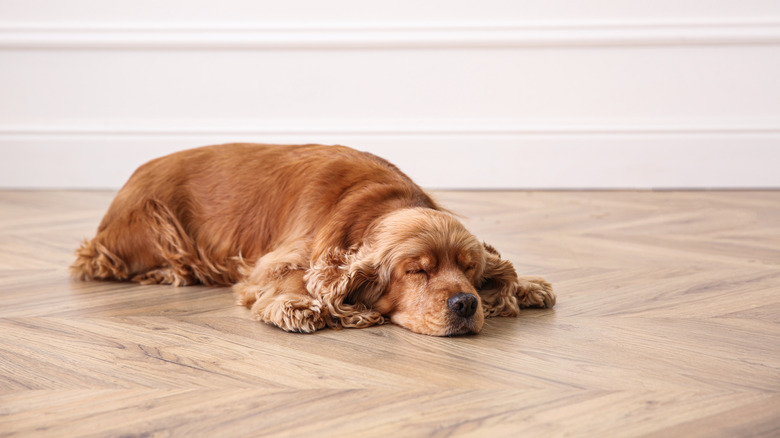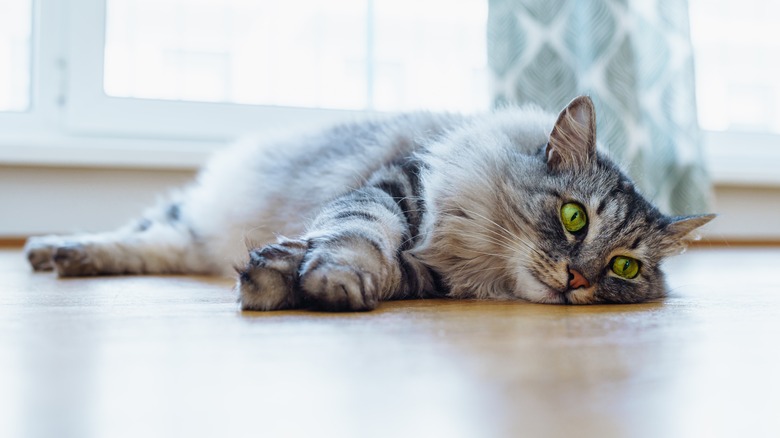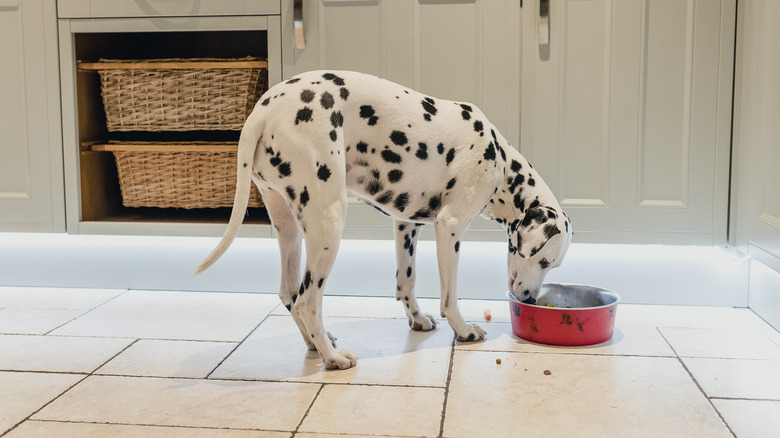Why You Should Think Twice Before Getting Hardwood Floors If You Have Pets
Hardwood floors are popular in homes because they offer a classic aesthetic that pairs well with a variety of decor styles and trends. Unfortunately, choosing hardwood floors when you have pets may not be the most practical flooring option for several reasons. First, hardwood floors are susceptible to scratches, and pet claws can easily leave visible marks, especially if you have an excitable furry friend. Even well-trimmed nails can cause damage over time, diminishing the aesthetic appeal of the floor. This is especially true for larger or more active pets that may inadvertently cause more significant wear and tear. According to the U.S. News & World Report, wood floors can cost anywhere between $14 and $32 per square foot, which is quite an investment that will likely need frequent upkeep with pets.
Secondly, hardwood floors are sensitive to moisture, and pet accidents or spills can lead to warping or staining. Accidental urine or water bowl spills can penetrate the wood, causing irreversible damage and requiring expensive repairs and efforts to remove the stench of pet urine. In homes with pets, the potential for accidents increases, making hardwood's vulnerability to moisture a significant drawback.
Finally, the smooth surface of hardwood can be slippery for pets, leading to potential injuries. Pets may struggle to maintain traction, especially if they have mobility issues or are prone to slipping. This is a particular concern for older animals or breeds with anatomical challenges. To address this, additional rugs or mats may be required, which could obscure the beauty of the hardwood floor.
Worst types of wood floors for pets
Not all floors are created equal, Softwood floors, such as pine or fir, are among the worst choices for homes with pets. These woods are more prone to scratches and dents, making them highly susceptible to damage from pet claws. Even routine activities like playing or your pet simply walking across the floor can leave noticeable marks, quickly diminishing the aesthetic appeal of the flooring. Additionally, softwoods are less resilient to wear and tear, and pet-related incidents can lead to more rapid deterioration compared to harder wood options.
While engineered hardwood is generally considered more stable than solid hardwood, those with thin veneer layers pose significant challenges in homes with pets. The thinness of the veneer makes it more susceptible to scratches and abrasions, as pet claws can easily penetrate the surface. Once the veneer is damaged, it becomes challenging to refinish or repair without risking further harm to the flooring.
Exotic hardwoods, such as Brazilian cherry or teak, are aesthetically appealing but not ideal for pet-friendly homes. These woods are often harder and more resistant to scratches, but their high density makes them less forgiving when it comes to moisture exposure. Pet accidents or spills can lead to staining and warping, and the exotic wood's unique properties may complicate repair efforts. Additionally, the cost of exotic hardwood makes any damage more financially burdensome to address, making them a less practical choice for households with pets.
Best alternatives to wood floors for pets
While some floors are a poor choice for your home if you have pets, laminate flooring is an excellent alternative to traditional wood floors for pet owners. Its layered construction, typically consisting of a durable wear layer, high-density fiberboard, and a moisture-resistant backing, provides superior resistance to scratches and dents. Laminate is also less susceptible to moisture damage, making it an ideal choice for homes with pets prone to accidents. The surface is easy to clean, and it maintains its appearance over time, even in high-traffic areas where pets roam.
Vinyl flooring, particularly luxury vinyl plank or luxury vinyl tile, is a pet-friendly option known for its resilience and versatility. Vinyl is resistant to scratches and stains, offering a durable surface that can withstand the daily activities of pets. It is also water-resistant, providing protection against spills and accidents. Additionally, the softness of vinyl makes it more comfortable for pets to walk on compared to harder surfaces, contributing to their overall well-being.
Tile flooring, whether ceramic or porcelain, stands out as an excellent pet-friendly option. Tiles are inherently scratch-resistant and impervious to moisture, making them an ideal choice for areas where pets frequently roam. Accidents are easily cleaned on tile without compromising the floor's integrity. Moreover, tile provides a cool surface that can be beneficial for pets during warmer seasons. Its durability ensures that it remains aesthetically pleasing even in high-traffic areas, making it a reliable choice for households with pets.


